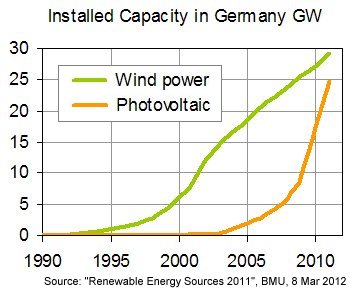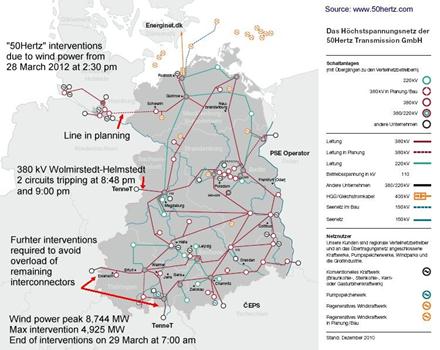German Power Grids Increasingly Strained
TOD intro: This is a guest post by Paul-Frederik Bach. Paul-Frederik has more than 40 years experience in power system planning. He worked with grid and generation planning at ELSAM, the coordinating office for west Danish power stations, until 1997. As Planning Director at Eltra, Transmission System Operator in West Denmark, he was in charge of West Denmark's affiliation to the Nordic spot market for electricity, Nord Pool, in 1999. Until retirement in 2005 his main responsibility was the integration of wind power into the power grid in Denmark. He is still active as a consultant with interest in safe and efficient integration of wind power.
German Power Grids Increasingly Strained
With a steep growth of power generation from photovoltaic (PV) and wind power and with 8 GW base load capacity suddenly taken out of service the situation in Germany has developed into a nightmare for system operators.

Figure 1
The peak demand in Germany is about 80 GW. The variations of wind and PV generation create situations which require long distance transport of huge amounts of power. The grid capacity is far from sufficient for these transports. The result is a remarkably large number of curtailments of RES (Renewable Energy Sources).
Efficient market arrangements are important for efficient congestion management, secure grid operation and overall market efficiency. Therefore the organisation of more consistent markets and redefinition of bidding areas deserve consideration. The ENTSO-E paper concludes: “If this infrastructure does not materialize in due time then the rate of RES increase should be examined under a more pragmatic prism”.
The Federal German Grid Agency has confirmed the assumption of a strained grid in a 120 page report on the supply situation for electricity and gas in Germany during the winter season 2011/12.

Much more at the link

